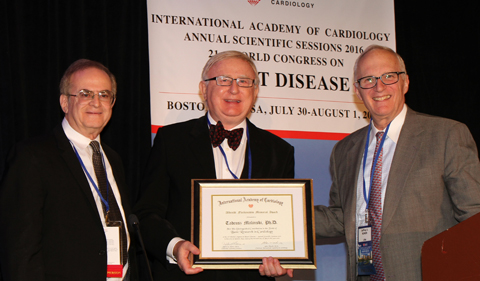
Dr. Tadeusz Malinski with Dr. Asher Kimchi and Dr. Jeffrey Borer
By Samantha Peko
NQPI editorial intern
Distinguished Professor of Chemistry and Biochemistry and Nanoscale & Quantum Phenomena Institute member Dr. Tadeusz Malinski was recently honored by the International Academy of Cardiology at the 21st World Congress on Heart Disease in Boston.
He received an award titled “The Albrecht Fleckenstein Memorial Award for Distinguished Work in the Field of Basic Research for Cardiology.”
This award recognizes Malinski’s lifetime work on the application of nanomedical systems for the early diagnosis, treatment and prevention of heart failure, cardiac vasculopathy and vascular diseases. Heart disease is the cause of nearly 25 percent of deaths in the United States – higher than cancer.
Malinski said he was excited to receive the award, which is typically given to individuals with medical degrees.
“It’s a very prestigious award. I am probably the only one in the past 25 years who is not a cardiologist,” Malinski said.
Malinski has reached many milestones in his career of research and development, and his contributions to the field of cardiology are vast. Nearly three decades ago, Malinski developed a first of its kind nanosensing system and technique that was small enough to be placed in hearts and could successfully measure the release and concentration of several small molecules, like nitric oxide, peroxynitrite and superoxide during a single beat of the heart.
This discovery offered a much more complete description of the heart and how the contraction and relaxation forces are regulated in the beating heart. In serious medical procedures, like heart transplantation, the preservation of these forces is vitally important. Having a better understanding of how the heart actually works made it possible to develop new solutions for storage, which could potentially double the time for the transplantation of a heart graft and improve the success of surgery.
These nanomedical studies have proven to be extremely useful with many practical applications. From his Down Syndrome study (covered by NQPI last spring), to extending the life of a preserved heart, to the recently patented new method of the accelerated healing of the vasculature in wounds, Malinski’s contributions to basic research in cardiology are numerous.
Malinski hopes to apply his findings using nitric oxide in the heart to study capillary function in the brain. This could have far-reaching ramifications on the study of diseases like Alzheimer’s, Parkinson’s, hemorrhagic stroke and aging in general.



















Comments